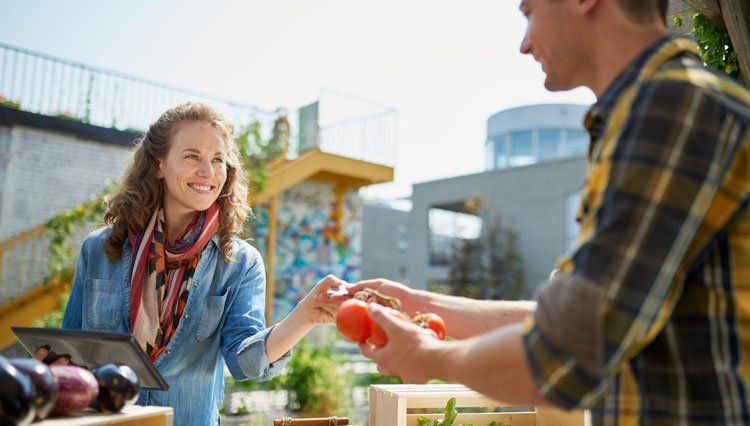What You Can Do In The City
We are all guardians of New Zealand’s land and water. At home, even in the city, there are lots of big and small ways you can contribute to lessening the pressure on the environment that sustains us all
Close the gap between farm and you
Our Land and Water research tells us that connection and collaboration is crucial to creating long-term changes to the way New Zealanders care for our land and water. Try these actions to build your connection to the people who produce our food and fibre.
- Close the gap between farm and plate by buying food from weekend markets or roadside stalls when possible.
- If you can, pay more for produce grown sustainably (eg organic, free range).
- Try online services that deliver produce directly from the farm, shortening the chain of businesses taking a share of profits, giving growers more income for sustainable actions. For example:
- Ooooby (organic produce in Auckland, Waikato and Christchurch)
- Google “meat direct from farm NZ” for a list of farms and butchers that sell and deliver meat directly to the public
- Read or watch some rural media to get outside your ‘filter bubble’:
- TV shows like Country Calendar (TVNZ OnDemand | YouTube) and Rural Delivery (TVNZ OnDemand | website) show what our best farmers are achieving.
- Read about the NZ Farm Environment Trust Award Winners.
- Hear from farmers themselves in the Farmers’ Weekly On Farm Story video series.
- Browse the rural section of Stuff or the NZ Herald to connect to the wider rural context and pressures.
- Follow the progress of Pā to Plate, which aims to reconnect Māori with produce from their ancestral whenua, beginning in Taitokerau (Northland).
- One of the reasons there are fewer sheep (and more cows) in Aotearoa these days is that the value of wool has fallen dramatically. If you can afford to, choose products made from New Zealand wool – especially strong wool, like carpets, rugs and insulation – to support our sheep farmers.
Improve your local waterway
Research across the country tells us that our rural and urban waterways are degraded. Here are some ways that everyone can contribute to restoring their local waterway.
- Join a Landcare Trust urban catchment care group. See In Your Catchment for more information.
- Volunteer to plant or fund trees via Trees That Count.
- Donate to the Million Metres Streams Project.
- When phosphorus enters our freshwater it can stimulate algal growth, leading to poor water quality. Phosphates in laundry and dishwashing detergents are being phased out, but some are still sold in New Zealand – check that you’re buying phosphate-free detergents.
- You probably already pick up rubbish when you notice it at rivers, lakes and beaches – but you can contribute closer to home by clearing any rubbish you notice in drains and gutters on your street.
- Products used on your property can flow to stormwater drains and into rivers. Before you hose oil and dirt off your driveway, use moss- or mould-killer or other chemical detergents, think about where that runoff is going to end up. Could you take your car to a car wash with drainage facilities? Could you sweep the sediment off your driveway instead of hosing it down the stormwater drain?
- Before you go swimming in a river or lake, check its swimmability on the LAWA website. Our Register of Land Management Actions research will soon be contributing to this useful website.
- While you're there, don't feed bread to ducks, which are a source of e.coli. So too is dog poo, so make sure you clean up after your pup.
- If you’re interested in how your local river or lake is being managed, find out more about what your regional council is doing and get involved. See In Your Catchment for more information.
Reduce food waste
About a third of all food produced is wasted. Every year Kiwis send 122,547 tonnes of food to landfill, wasting $872 million a year. This puts pressure on farmers to produce more, which puts extra pressure on the land and environment.
- Shop to a meal plan, so you only buy food you plan to cook.
- Freeze food before it goes off.
- Ensure your fridge is below 5°C.
- If you do accidentally let fresh produce spoil, compost it to avoid greenhouse gas production and reduce waste to landfill.
- If you’re an apartment-dweller or otherwise unable to compost, here’s how to donate your food waste to composters.
- Support a local food rescue organisation.
- For some great tips, check out Love Food Hate Waste NZ.
 View Our Strategy Document 2019 – 2024
View Our Strategy Document 2019 – 2024



